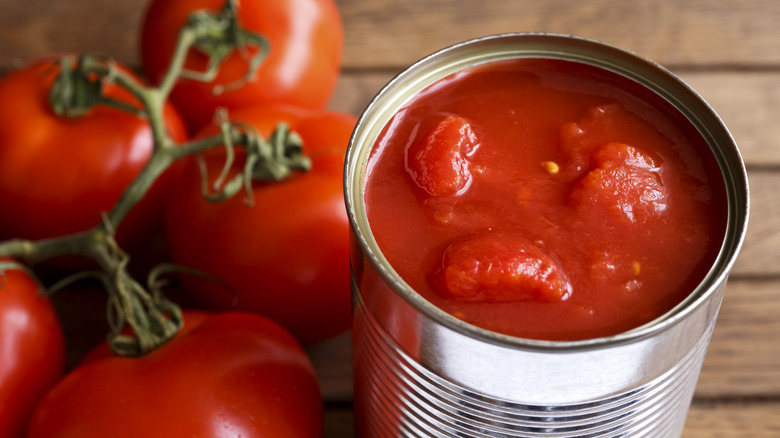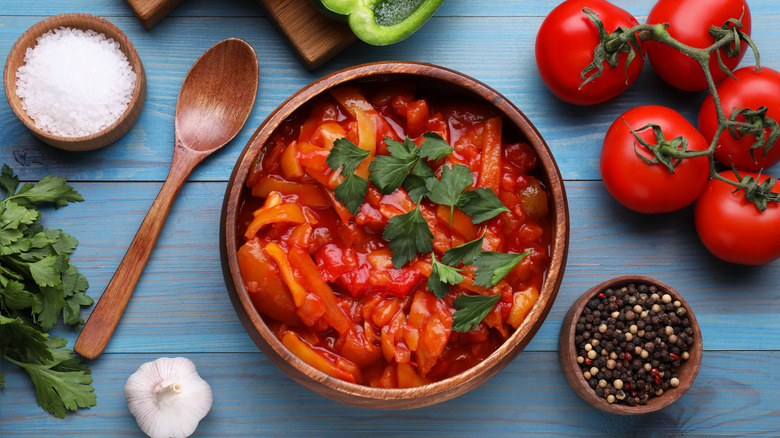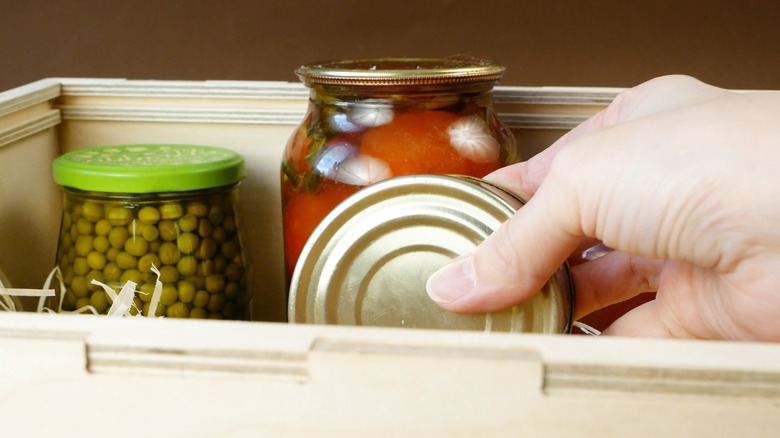The Nutritional Advantage To Buying Canned Tomatoes Over Fresh
For over 200 years, canned foods have acted as a critical safety net for the global food supply, particularly in times of scarcity or war. In recent decades, though, they've endured a harsh reputation as sodium-filled, nutrient-depleted versions of healthy foods. The "Fresh is Best" proponents claim that canning destroys fragile vitamins and adds harmful ingredients to an otherwise wholesome food, and they're not entirely wrong. Some canned tomato products like pasta sauce or salsa are packed with added sugars and salt.
Another concern over canned fare is exposure to bisphenol A (BPA), an industrial chemical used in metal food packagings like steel cans and lids. Although the FDA considers BPA safe for food contact, many manufacturers have removed it from their canning process anyway to err on the side of caution. (Animal studies have shown BPA to adversely affect prenatal development, but only in extremely high doses.) Fortunately for the modern consumer, BPA-free canned foods are commonplace in most grocery stores now.
A noteworthy jewel among the canned crowd is tomatoes. They come in a dozen forms — stewed, diced, seasoned, puréed — and are arguably tastier than their fresh counterpart. Unless you're growing them in your own garden, canned tomatoes are almost certainly cheaper than fresh, too. And the best part? They boast nutritional (as well as culinary) benefits that may trump their fresher siblings.
Canned tomatoes may be healthier than fresh
It's a myth that canned food is always high in sodium, and the "no salt added" notation on many canned products has become ubiquitous in most grocery stores. That's great news if you're trying to balance sodium and potassium levels for blood pressure since tomatoes are a good source of potassium and naturally low sodium. They're also free of saturated fat, cholesterol, and common allergens, which is to say that they're a safe bet for a potluck or picnic.
Now, it's true that the high pressure and high heat of this preservation process destroy some water-soluble vitamins, especially vitamin C, but did you know that one of the tomato's most powerful components is easier to absorb after processing? It's lycopene, the antioxidant responsible for tomatoes' rich red color and its protective potential against inflammation and many diseases. Lycopene becomes more bioavailable after cooking, so our bodies can get more good stuff. Essentially, folks who eat more lycopene-rich foods (like tomatoes) are less likely to develop the top-three dangers of heart disease, cancer, and diabetes. That's some powerful persuasion to pop open a tomato can today.
Canned is convenient and cost-saving
Sure, you can't use canned tomatoes for every recipe, but honestly, some of the best tomato recipes just turn out better when using the canned variety. Many cooks find it to have a richer, more intense flavor since canned products are usually picked at the peak of ripeness. Of course, canned tomatoes are ideal for sauces in layered dishes like lasagna and enchiladas, but you can also get more mileage by using them in a homemade tomato soup or veggie chowder.
There are certainly a few caveats you need to know about tomatoes in their fresh state, whereas the canned variety is usually much simpler to use. No washing, cutting, or peeling required. Plus, you can choose the size of canned tomato that suits your recipe, whether whole, diced, or puréed. You can't beat that convenience.
The bottom line is there's nothing wrong with using canned food, especially when the price point and shelf stability help you get your five-a-day consistently. That's a big deal when almost 90% of Americans aren't meeting their daily vegetable requirements. Add canned tomatoes to your pantry lineup today for a healthy win.


